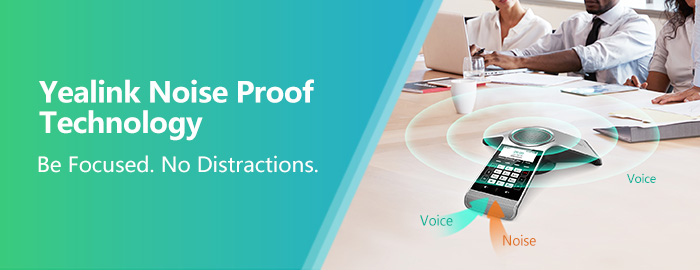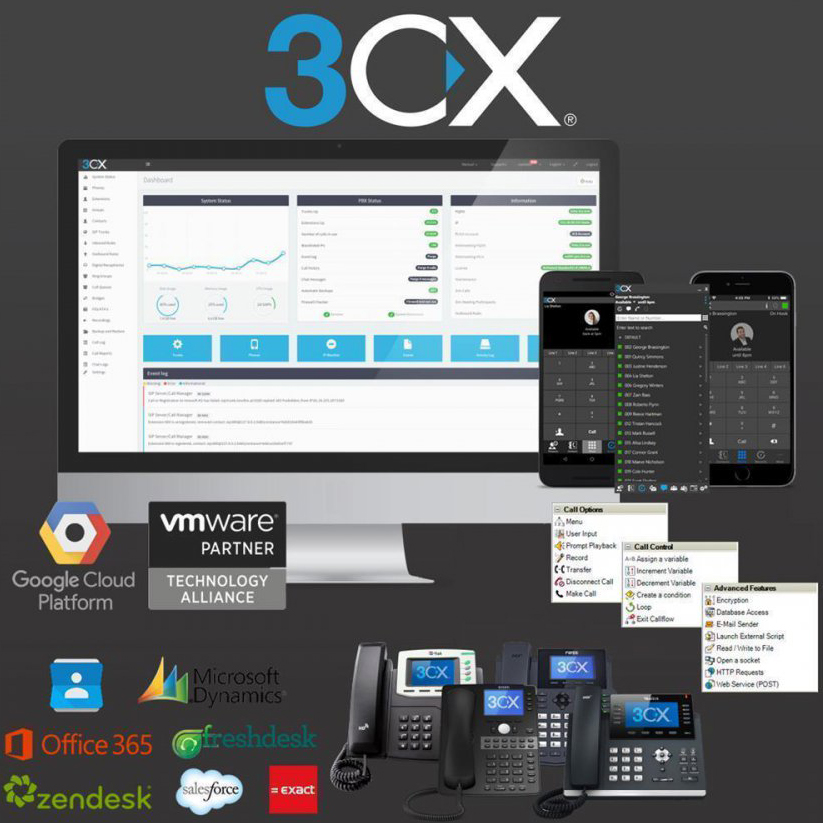Making phone calls is part of everyday business for most of us. In the wake of the current technological boom, more and more companies ask themselves how they will make phone calls in the future. VoIP telephone systems are a cost-effective and secure alternative to traditional PBX telephone systems and offer numerous advantages to more companies.
This article explains how an IP telephone system works and when switching to a VoIP telephone system that uses the cloud makes sense.
Table of Contents
What is a VoIP Telephone System?

Did you know that you can fully customize your VoIP telephones? This VoIP telephone system has been provisioned and is ready for deployment!
A VoIP telephone system, also called IP-PBX, is a telephone system that no longer runs via a conventional telephone connection as usual. The telephone calls are made via an internet connection. With this communication technology, voice information is converted into digital data packets, transmitted to the recipient via the IP network, and then reassembled as voice information. The Session Initiation Protocol (SIP) establishes and terminates the connection.
With an IP PBX, telephone cabling is no longer required at the company site. The virtual PBX uses the data network to establish a connection with the telephones or other IP-enabled terminals. SIP PBXs can also be easily connected to traditional telephone lines (PSTN lines) via a VoIP gateway, allowing a smooth transition.
What Makes a VoIP Telephone System?

If you’ve never had breakneck internet speeds, this is how you look the first time you log in and open your browser.
Only two things are required to use a cloud-based VoIP telephone system: a sufficiently fast and stable broadband Internet connection and IP-capable end devices that support SIP. However, purchasing hardware such as an IP phone is not necessary. You can also use the VoIP system via a softphone on your PC or via your mobile devices.
If you choose an IP-based hardware PBX, in addition to the above factors, you will need the PBX itself, a SIP trunk, and possibly a VoIP gateway.
Technology

No matter your VoIP telephone system, the hardware types will always be the same. Not necessarily the same brands, but the technology to enable you to make calls is generally the same across the board.
A VoIP PBX consists of an IP PBX server, one or more IP phones, and an optional VoIP gateway. This ensures that the VoIP system can be connected to traditional telephone lines. Unlike traditional telephone systems, the telephones are no longer plugged into the TAE socket, an ISDN box, or a splitter but into the DSL router or a VoIP-capable cable modem, which then establishes a connection to the Internet.
Using a SIP trunk, it is possible to connect local telephone systems to the Internet for VoIP. The IP telephones or the employees’ computers are directly connected to the telephone system via the company network.
Reasons to Switch to a VoIP Telephone System

The death of ISDN can’t come soon enough. Modern VoIP telephone systems don’t use ISDN because they are much more efficient, cost less to run and maintain, and are not scalable, amongst other things.
In the course of Telekom’s All-IP changeover, which will be completed in 2020, it is important to deal with the topic of “IP telephony” at an early stage. Because the changeover means the end for ISDN and also affects your company. Although you can continue to use your ISDN telephone system in most cases, the maintenance of these systems is becoming increasingly complex, as the manufacturer can supply spare parts for ISDN connections less and less frequently. With an outdated ISDN system, you miss out on many benefits, which could be a significant disadvantage for your business.
To help you decide when it makes sense to switch to an IP PBX, we have compiled a list of various arguments below:
- Your phone system is outdated. (Even if you can connect your old telephone system to the telephone network via your Internet connection using a SIP PBX connection, this option does not allow you to take advantage of all the benefits of the NGN (Next Generation Network)).
- You want more flexibility. (You would like to integrate your smartphone, employees in the home office, and different locations, possibly even abroad, into the telephone system).
- You want to save on telephone costs (e.g., maintenance, repair, or connection charges).
- Your company has only recently been established. (You want to avoid hardware investments as much as possible and want a telephone system that flexibly adapts to your company’s needs).
If one of the above cases applies to you, a VoIP telephone system can offer you many advantages.
1. Cost Advantages

Saving money now is more important than ever! Did you know that a VoIP telephone system can save you up to 80% per month on your phone bill?
Compared with a conventional telephone system, a VoIP telephone system is significantly less expensive. Users benefit above all from the VoIP providers’ low connection charges and no longer need to invest in hardware. Hardware investments are no longer necessary with an Internet telephone system – unless you purchase VoIP telephones or an IP-based hardware telephone system installed locally at your company. However, buying VoIP phones (e.g., a desk phone or DECT phone is optional. In most cases, you can also continue to use your analog or ISDN telephones using an analog telephone adapter (ATA) or an ISDN telephone adapter (ITA). Connecting your PC or smartphone to the telephone system is also possible.
You can make national and international calls via a VoIP provider and save more than half of your costs compared to your previous telephone connection (ISDN). Also, VoIP allows you to connect to different locations, making in-network calls free of charge.
2. Better Cost Control

The bottom line is that VoIP telephone systems are significantly less expensive than traditional PBX services, and you get a lot more bang for your buck with VoIP.
With IP telephony, incoming and outgoing call data is stored in a database on the server. This way, you can keep track of your telephone costs and call volume at all times.
Easier installation, configuration, and operation thanks to an intuitive user interface. A software-based IP PBX is easy to use thanks to an intuitive web user interface. Installation and configuration of the PBX can be performed by any user who knows network technology and computers. Installation and configuration involve more effort than conventional telephone systems, and often this work can only be performed by manufacturer experts.
3. Plug & Call: Quick Setup of Workstations

Whether you’re working remotely or hot-desking, You’ll never be tied down as long as you have a VoIP telephone system.
Hot desking is being used more and more frequently in companies because it allows for more flexible workplace design. With this model, employees are no longer assigned a fixed workstation but take any free workstation whenever needed. VoIP telephony is a great advantage for this way of working because it enables employees to log on to the telephone at hand at any workstation. This means they can continue making calls without reconfiguring and can even be reached under their previous telephone number.
4. No More Cabling

VoIP telephone systems no longer require running cables throughout the office. Many VoIP phones have PoE, so you can plug it into the wall, and you’re good to go!
Using Voice over IP (VoIP for short), telephone calls can now be transmitted over the IP network. This means that all voice information and data are now only transported over a joint line (via DSL as a packet-oriented network), which means that complex cabling is no longer necessary.
Telephones can be connected to the telephone system via a conventional network connection. If you want to make calls via your PC, you can install a softphone directly on it. The installation of additional telephone connections is no longer necessary.
5. Manufacturer Independence

You can choose whatever make and model you want to use with your VoIP telephone system. You’re not tied down to any one manufacturer.
Another advantage you can benefit from when switching to an IP PBX is the free choice of SIP phone manufacturer. IP PBXs use the SIP protocol, which is why you can use just about any SIP phone or VoIP gateway for VoIP communication. This is different from traditional telephone systems. Here, you can usually only access new features by purchasing new hardware or expansion modules.
6. Huge Range of Functions

Who doesn’t want a range of valuable functions? VoIP telephone systems use software that gives you access to everything you need and more!
IP-based telephone systems have many functions far exceeding that of a traditional telephone system. The high number of functions is because VoIP systems are software-based. This simplifies the development and optimization of existing functionalities. In addition to the standard functions of an analog or ISDN telephone system, such as call waiting, call forwarding, and call swap, many other valuable features are available among the more than 100 functions. Please visit us here and fill out the form if you’d like to learn more about how VoIP can benefit your business.


Recent Comments